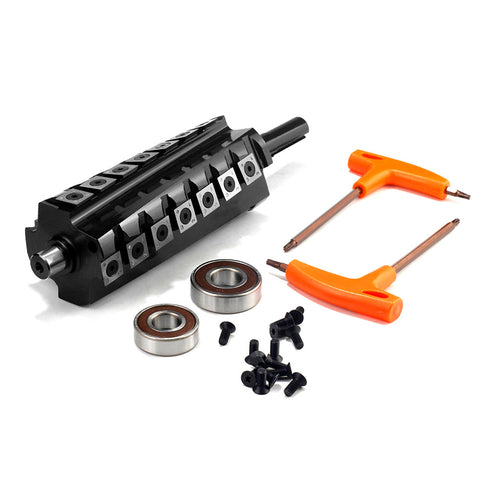Precision and Portability: The Rise of the Benchtop Helical Planer in Modern Woodworking
In woodworking, achieving a perfect, smooth surface is essential, whether for cabinetry, furniture making, or custom carpentry. Planers are vital tools in this pursuit, and recent advancements have brought forth a new generation of machines: benchtop helical planers. These compact, high-performance tools combine the precision of helical cutting technology with the portability and convenience of a benchtop design. Ideal for professional workshops and hobbyists alike, benchtop helical planers are changing the landscape of woodworking by offering an efficient and versatile solution for achieving exceptional surface quality without the bulk of industrial machinery.
The helical cutting design is what truly sets these
benchtop planers apart. Unlike traditional straight knife planers, which use a single blade that strikes the wood surface in a linear motion, helical planers are equipped with a series of small, replaceable carbide inserts arranged in a spiral pattern around the cutting head. These inserts produce a shearing action as they cut through the wood, resulting in cleaner, smoother surfaces with minimal tear-out. The spiral configuration also means that each insert contacts the wood at a slight angle, providing a continuous, controlled cutting action that significantly reduces noise and vibration, a welcome benefit in smaller workshop environments where noise control is essential.
Portability is another advantage of the benchtop helical planer. Many woodworkers have limited space, and a large, floor-standing planer may not be feasible for smaller workshops or home garages. Benchtop models provide the quality and capability of larger machines without requiring a dedicated workspace. Despite their compact size, these planers are often capable of handling substantial workloads, including hardwoods, softwoods, and even some composite materials. For hobbyists, DIYers, and small-shop professionals, this combination of power and portability is invaluable, allowing them to achieve professional-grade finishes in a compact and accessible format.
Benchtop helical planers are also more user-friendly and efficient when it comes to maintenance and upkeep. Each carbide insert on the helical head can be rotated multiple times before it needs to be replaced, extending the life of the cutting edge and reducing downtime for maintenance. When an insert eventually becomes dull, only the affected insert needs to be changed, unlike straight knife systems, which require the replacement or sharpening of an entire blade. This modular approach not only saves time and money but also ensures that the planer remains consistently sharp and ready for use, making it an especially efficient choice for woodworkers who prioritize minimal interruption in their workflow.
The durability and longevity of carbide inserts in helical planers are other factors that make them appealing. Carbide is significantly harder and more wear-resistant than high-speed steel, the traditional material for planer knives. This enhanced durability is particularly useful when working with abrasive woods, reclaimed lumber, or wood with embedded debris, which can quickly dull standard blades. With carbide inserts, woodworkers can confidently tackle challenging materials without compromising the quality of their cuts or risking frequent replacements. In addition, the durability of these inserts reduces the long-term cost of ownership by eliminating the need for frequent replacements, a benefit especially valuable to small shops and independent craftsmen managing tight budgets.
Benchtop helical planers also enhance safety and control. Traditional straight knives can sometimes produce kickback, as the blade edge strikes the wood abruptly, creating a jarring impact that can affect stability. In contrast, the shearing cut of a helical planer reduces the risk of kickback by creating a smoother, more consistent engagement with the workpiece. This smooth action gives operators better control over the material and provides a safer and more comfortable working experience, a critical factor for users in smaller, close-proximity workshop setups.
One of the additional perks of benchtop helical planers is their ability to handle a wide range of wood types with ease. From dense hardwoods like maple and oak to softer woods like pine, the shearing action of the helical head maintains a high-quality surface with minimal tear-out, even on tricky grain patterns. This versatility is a game-changer for woodworkers who work with different species or who need to produce a variety of finishes for different projects. Whether flattening rough-cut lumber, dimensioning stock, or achieving a smooth finish for finishing, the benchtop helical planer's precision and adaptability make it a reliable tool for nearly any task.
As woodworking continues to grow in popularity, and as more people take on custom projects from home workshops, benchtop helical planers represent a perfect blend of functionality, precision, and portability. They provide the cutting-edge technology of larger, industrial planers while remaining accessible to users without dedicated shop space. For professionals, these tools add versatility and convenience, particularly for on-site work or smaller jobs. For hobbyists, they bring the opportunity to achieve results that rival professional-grade work, all within the confines of a small, manageable machine.
In today's woodworking industry, benchtop helical planers are more than just a trend; they represent a technological evolution that caters to the needs of modern woodworkers seeking both quality and convenience. With their ability to deliver cleaner cuts, reduced maintenance, and quiet operation in a compact form, benchtop helical planers are proving to be essential tools for anyone who values precision and efficiency in their craft. As technology advances further, the potential for benchtop helical planers to bring even more innovations to small-scale and professional woodworking is vast, making them a cornerstone in the future of woodworking excellence.

